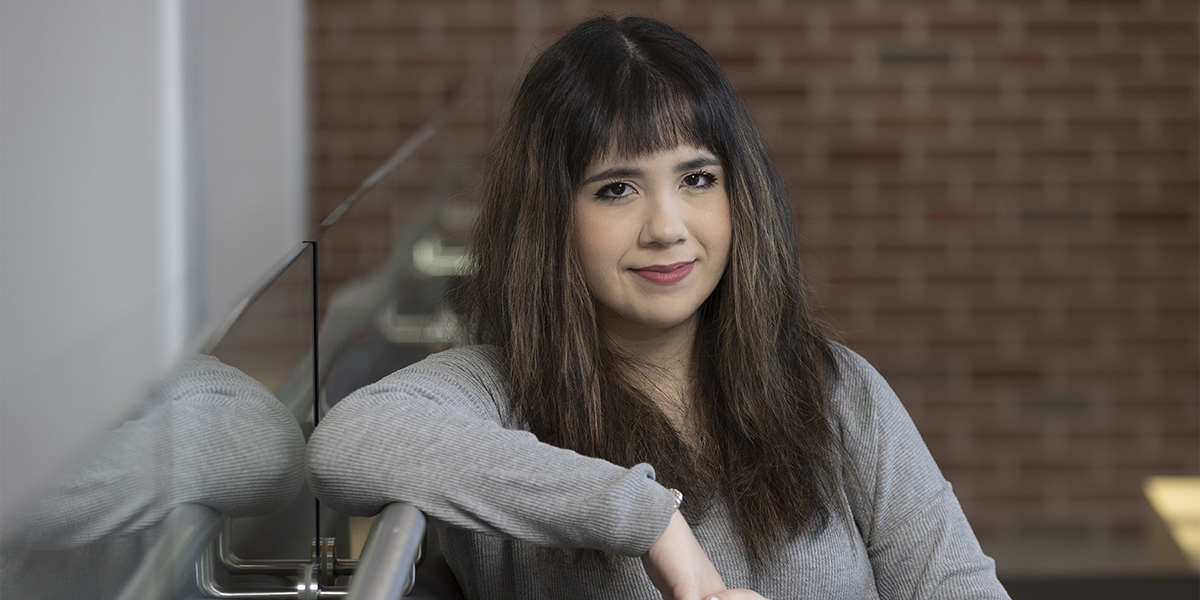Student analyzes tweets to gauge political sentiment

Using tweets from the accounts of influential political figures, a Binghamton undergrad analyzes sentiment in order to read between the lines.
Lisa Foreman has been an active participant in multiple research programs on campus since her first year at Binghamton University. Now, in her third year, she has effectively incorporated her passions for political science and Russian studies into her research.
Foreman was able to pave her own path with her studies, thanks in large part to the Source Project, a first-year honors research program in which students can choose between various streams of study, ranging from education to sustainability in art, to complete research in the humanities.
“When I saw other people doing research, I was like ‘Oh man! I need to start researching!’ Foreman said. “By the time I was accepted to Binghamton and to the Source Project, I was already so excited because this was what I was waiting for; now it was my turn to join the scholarly conversation.”
Foreman, who grew up on Staten Island, developed her core research interests as a first-year student. She also credits the program with allowing her to continue research in Russian studies.
“Before I had even accepted my enrollment to this school, I was already attending info sessions and learning about what it would be like to be in the specific track that I was interested in,” she said. “I felt like I was appreciated immediately, and I felt like I was really understood as an applicant.”
In addition to her research projects, Foreman is involved with TEDxBinghamton University. As the director of content, she plays a significant role in organizing the annual conference in the spring, and encouraging student speakers, alumni speakers and professionals who want to share their message on the TEDx stage.
“We tap into every corner of the University possible, while also bringing something new to them,” Foreman said.
During the summer of 2022, Foreman took part in the Summer Scholars and Artists Program, conducting research in sentiment analysis in relation to the Russian-Ukrainian conflict. She was referred to the program by her former professor, Mikhail Filippov, who now serves as her advisor.
“We have already started to work on her 80-page honors thesis and I have no doubts that she will complete it successfully,” said Filippov, a professor of political science. “Overall, it is a very rewarding experience for me, largely because Lisa acts as a highly motivated, excellent student with self-discipline.”
Foreman uses a research plan, inspired by her work in the Source Project, to analyze tweets selected from the Twitter accounts of influential political leaders such as President Joe Biden and U.S senators.
Foreman identifies key words and phrases that correlate with sentiment. A single tweet is analyzed for its polarity, as in whether it is positive or negative, as well as the degree at which this is expressed, which is considered as its subjectivity. For example, a tweet with positive polarity and high subjectivity would have a positive sentiment.
As she outlines the background, methods and question of inquiry in her fundamental work, Foreman is able to improve the guidelines and accuracy of her project.
“By unpacking certain cross sections of social media, information and conflict, my research can be used to expand awareness regarding political social media,” she said. “I amalgamated so much knowledge and understanding of this process, but things can definitely be narrowed.”
Foreman said she has had a unique experience studying Russian literature during a time of war in the region. Through her classes, she experienced the Russian-Ukrainian conflict from a humane and scholarly perspective.
“I was in a Russian language course at that point, and one of my classmates was Ukrainian,” she said. “It was spoken about a lot within the German and Russian Studies Department, and even outside of that. It was interesting to not only discuss it in a casual sense, but to really be exposed to people who were directly affected by it, while also considering it as an academic.”
The application of computer programming in her project introduced a new aspect that allowed for greater creativity, Foreman said. “With an essay you write until you feel like your argument is complete, but that’s kind of ambiguous,” she said. “Coding felt more artistic and creative, more so than any other math or science class I had taken before, as well as how much you can do with it.”
Foreman intends to explore the role of social media in conflict and how computer-aided text analysis can be used to understand it. She hopes that her project will contribute to the growing discussion of how social networking platforms present global affairs.
“Social data science is an emerging discipline that my project fits into,” Foreman said. “I’m just trying to keep up with the curve and contribute something to this discussion while tying it into another fairly new discipline.”
